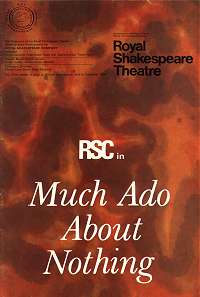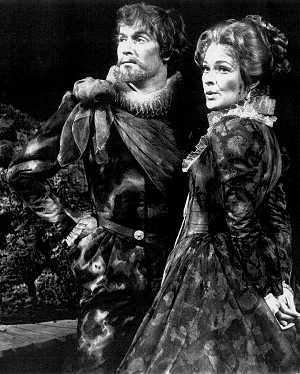
 |
'Much Ado' played with fun and flairThere comes a time in every Shakespearean players life when he or she must submit to the severe test provided by the roles of Beatrice and Benedict in Much Ado About Nothing. That was the test faced by Janet Suzman and Alan Howard at Stratford last night. Taking the roles for the first time, they stood up for comparison with the Theatre's elite who had previously won great acclaim for their handling of these difficult parts. Mr. Howard and Miss Suzman were undaunted by previous reputation, however, and won the hearts of the first-night audience with performances that were original and very funny. The volatile Beatrice, self-assured, and with a ready tongue, was a brilliant performance by Miss Suzman - a real little spitfire. Mr. Howard seems to have a natural talent for humour. His timing and exquisite facial expressions were perfect, and his wide-eyed horror at the first connection of his name with Beatrice was a delight. |
 |
|
Bernard Lloyd gave a tender, smooth performance as the love-struck Claudio, and Helen Mirren, as Hero, was as coy and virginal as the part demanded. Shakespeare's dig at the ignorance and self-importance of local officialdom was the creation of the part of Dogberry, here wonderfully portrayed by David Waller. Springing up and down on his toes in the best policeman fashion, bursting with self-importance and speaking in condescending tones to his friend and headborough, Verges (Clifford Rose), Mr. Waller's Dogberry was a character of cartoon proportions.................................................................. |
R.S.
Coventry Evening Telegraph, 15.10.68.
Gareth Lloyd Evans.
The Guardian, 15.10.68.
|
Irving Wardle. The Times, 30.7.69. |
|